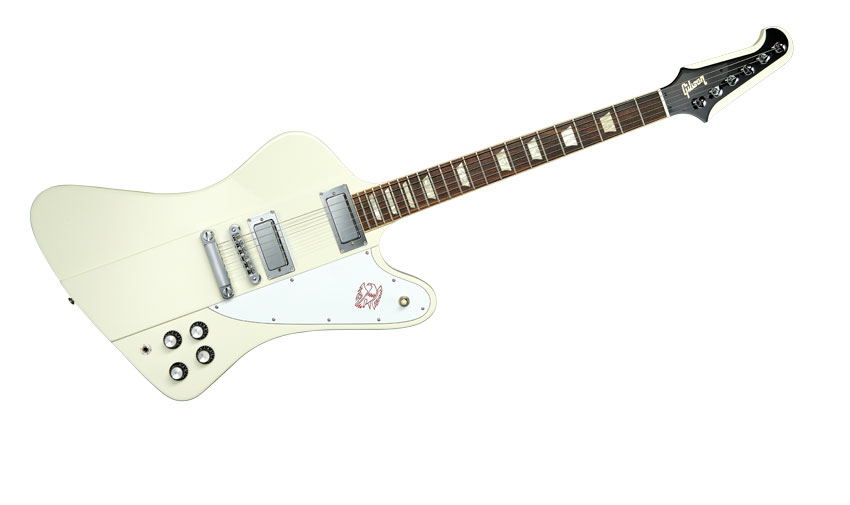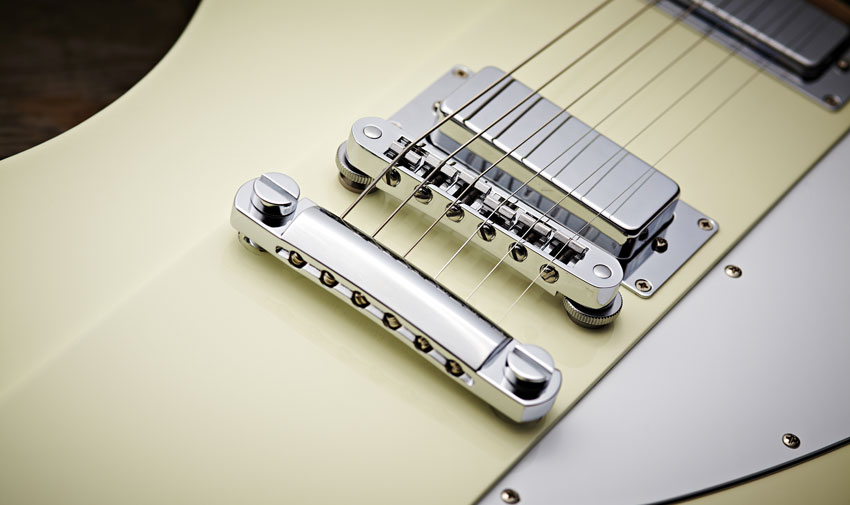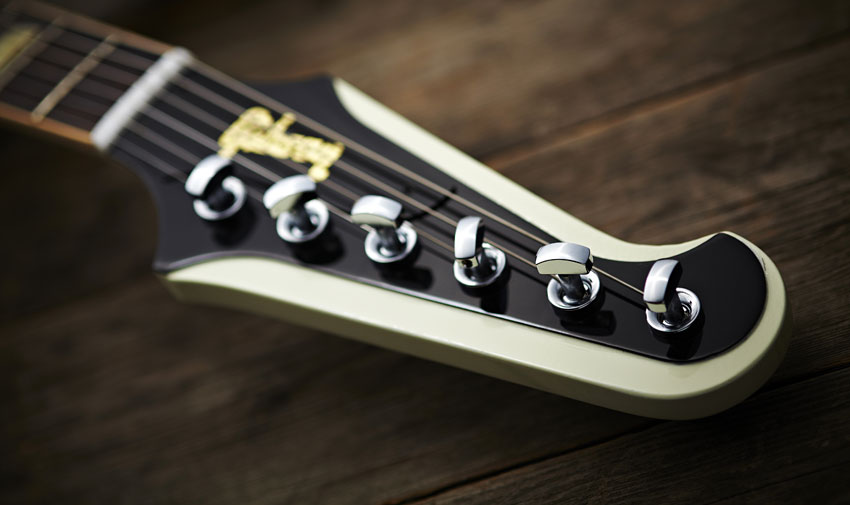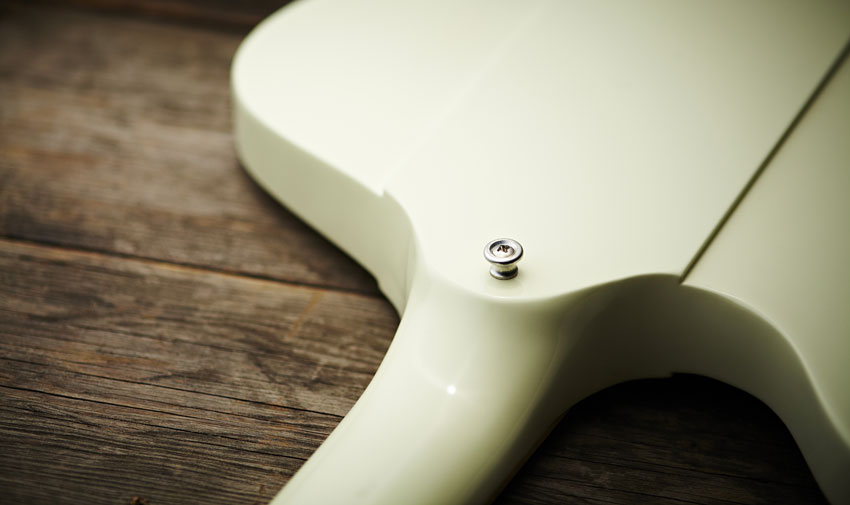MusicRadar Verdict
Even in these austere times, this feels like a bargain!
Pros
- +
Drop-dead gorgeous looks with tones to match. Light weight.
Cons
- -
A few sharp fret ends and binding shrinkage.
MusicRadar's got your back

Gibson Firebird V review

Bridge

Headstock

Rear
Firebirds occupy a curious niche in the electric guitar universe. Unlike Gibson's other iconic 'shape' guitars, the Firebird doesn't holler 'hard rock' from the rooftops. Its association with a mixed bag of artists such as Brian Jones, Clarence 'Gatemouth' Brown, Johnny Winter, Eric Clapton and Phil Manzanera lend its various incarnations leftfield art school and blues connotations and, dare we say it, a couple of extra notches of outsider cool compared with the stonewash and high-top-wearing midlife crisis hinted at by a Flying V or Explorer.
Build
The stunning reverse-bodied 1963-style Firebird V 2010 has a stop-bar tailpiece rather than the original model's Maestro vibrato and Lyre cover, and it also comes loaded with a nod to modernity in the shape of a sextet of Steinberger gearless tuners.
"Everyone in the office, from blues hounds to hard-rockers and jazz fusionistas began crawling Gollum-like towards it"
Providing a discreet substitute for the banjo-style tuners sported by original 'birds without disrupting the headstock's iconic lines, the Steinberger units are much smoother and altogether more precise in operation. They're a clever and welcome addition.
It's impossible not to be drawn to this guitar; the Classic White finish is simply gorgeous. On removing it from the Gibson hard case, everyone in the office, from blues hounds to hard-rockers and jazz fusionistas began crawling Gollum-like towards it, compelled by its flawless allure. This is about as good-looking a guitar as we've seen, and if you don't think that's important then, frankly, you're reading the wrong publication.
Of course, close inspection reveals that the Firebird V isn't flawless, but then Gibsons never have been, even in the 'golden era' between the late 1950s and the mid-1960s when the Firebird was born. It certainly didn't stop Gibsons featuring on probably more than half of the most important popular music recordings in history.
Here, there's a little binding shrinkage that causes a fractional lip to be perceptible along the treble and bass sides of the neck, but it's not so pronounced that you notice it in the heat of battle. In addition, there's a little bit of scruffiness to the finishing on the eye-catching headstock fascia, but it wouldn't be significant enough to discourage us from parting with a couple of monkeys for this deeply attractive instrument.
At seven pounds on the nose, it's one of the lighter off-the-shelf Firebirds available, perhaps surprisingly so, given the guitar's vintage-style nine-piece mahogany and walnut neck-through-body construction with glued mahogany 'wings'. Whether the next Firebird V off the production line in Gibson's Nashville factory is as light is debatable, but this example is a lovely weight and incredibly resonant when strummed acoustically.
The hybrid 50s rounded/60s slim-taper neck shape is a delight to play, and upper fret access is effortless across the 'board - no wonder, then, that Firebirds have proved so popular with slide players over the years. Strike a 1st-position chord and this guitar throbs as if it's straining at the leash, desperate to be plugged in and allowed to soar.
Sounds
"It's easy to see why these guitars are often regarded as the Gibsons that best suit Fender players"
The Firebird V's 495R (neck) and 495T (bridge) mini humbucker pickups have ceramic magnets that deliver a bright, twangy sonic palette. It's easy to see why these guitars are often regarded as the Gibsons that best suit Fender players, because it's possible to encroach on Telecaster territory, or even Jimi sounds with an appropriate fuzz pedal.
There's bite in spades, but it certainly isn't a flimsy sound, and judicious use of the tone controls allows you to get close to the warmth and fatness of regular 'buckers as and when required. All in all, it's an incredible, versatile-sounding guitar that begs to be strapped on and gigged.
Make no mistake, the Firebird V is the kind of guitar you'd save from a burning building. It looks the proverbial million dollars, and just feels and sounds a little classier than its brethren in Gibson's Firebird lineup.
Chris Vinnicombe worked with us here on the MusicRadar team from the site's initial launch way back in 2007, and also contributed to Guitarist magazine as Features Editor until 2014, as well as Total Guitar magazine, amongst others. These days he can be found at Gibson Guitars, where he is editor-in-chief.
“A synthesizer that is both easy to use and fun to play whilst maintaining a decent degree of programming depth and flexibility”: PWM Mantis review
“I feel like that song had everything we needed to come back with”: Bring Me The Horizon’s Lee Malia on Shadow Moses, its riff and the secrets behind its tone, and why it was the right anthem at the right time
“I said, ‘Are we sure we can write a song about death?’”: The story of Mike + The Mechanics' classic No.1 The Living Years









